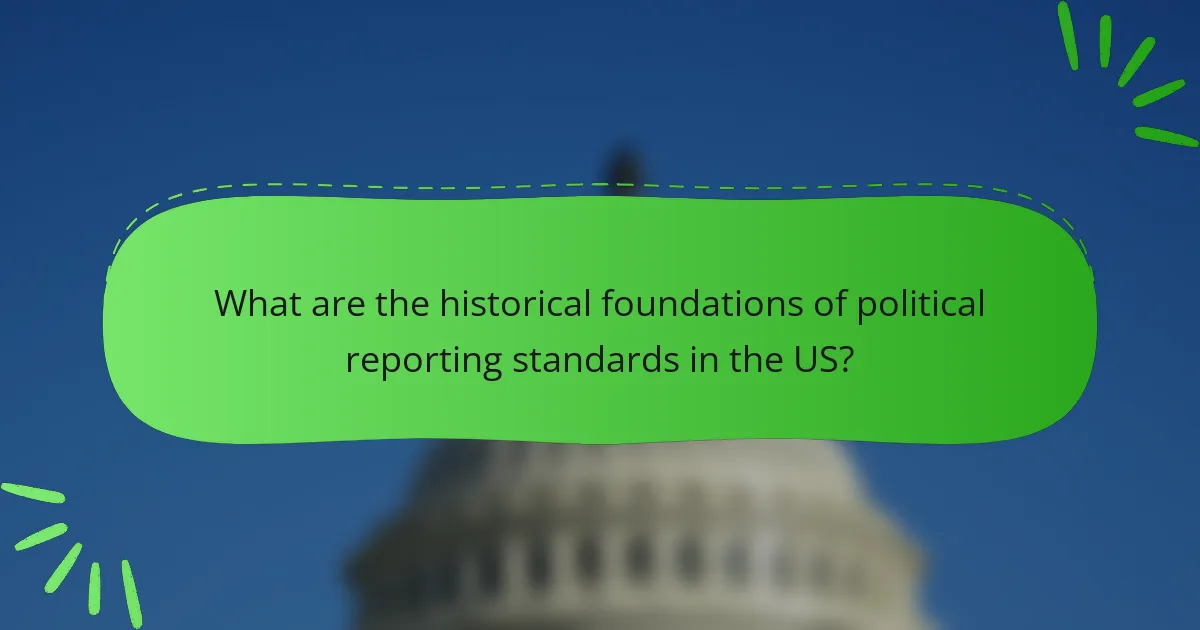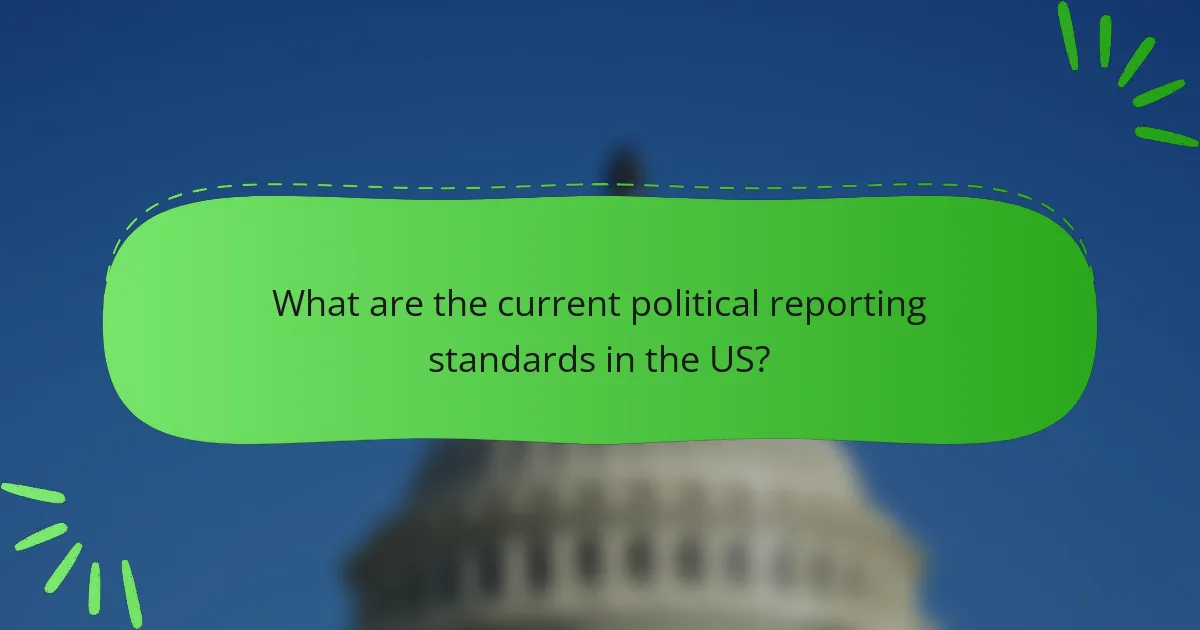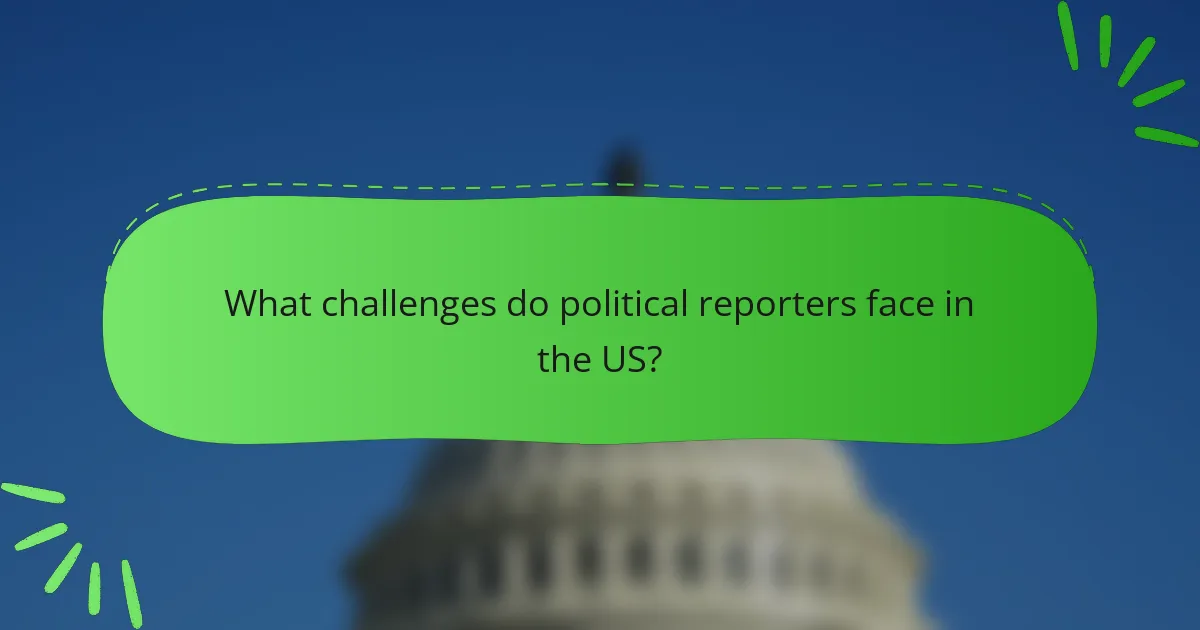Political reporting standards in the United States have evolved significantly since the First Amendment was ratified in 1791, which guarantees freedom of the press. Early newspapers were instrumental in fostering political discourse, and the emergence of partisan journalism in the 19th century led to the establishment of professional standards for accuracy and fairness. Today, these standards emphasize the importance of verifying facts, providing context, and ensuring balanced coverage of political viewpoints, as outlined by the Society of Professional Journalists’ Code of Ethics. However, contemporary political reporters face challenges such as media polarization, the pressure for rapid content production, the prevalence of misinformation, and threats to their safety, all of which impact their ability to report effectively and maintain public trust.

What are the historical foundations of political reporting standards in the US?
Political reporting standards in the US have historical foundations rooted in the First Amendment. The First Amendment, ratified in 1791, guarantees freedom of the press. This legal protection allowed journalists to report on government actions without fear of censorship. Early newspapers often served as platforms for political discourse and criticism. The rise of partisan journalism in the 19th century shaped reporting practices. Journalists began to adopt standards for accuracy and fairness as professionalism emerged in the late 1800s. The establishment of organizations like the Associated Press in 1846 set guidelines for news reporting. These developments laid the groundwork for modern political reporting standards in the US.
How have early journalism practices shaped modern political reporting?
Early journalism practices have significantly influenced modern political reporting. The emergence of the penny press in the 1830s democratized news access. This shift encouraged the reporting of political events to a broader audience. Sensationalism became a hallmark of early journalism, setting a precedent for engaging storytelling. The use of investigative reporting began with early muckrakers exposing corruption. This tradition persists today in political journalism. Furthermore, the establishment of journalistic ethics in the early 20th century has shaped standards for accuracy and objectivity. The Federal Communications Commission’s regulations also stem from early practices, ensuring fairness in political reporting. Overall, early journalism laid the groundwork for the principles and techniques used in contemporary political reporting.
What were the key events that influenced the evolution of these practices?
The key events that influenced the evolution of political reporting standards in the US include the establishment of the Federal Communications Commission (FCC) in 1934. This event marked the beginning of federal oversight in broadcasting. The Fairness Doctrine, implemented in 1949, required broadcasters to present balanced viewpoints on controversial issues. The Watergate scandal in the 1970s significantly impacted journalistic integrity and accountability. The rise of the internet in the late 1990s transformed how political news was reported and consumed. The introduction of social media platforms in the 2000s further changed the landscape of political reporting. Each of these events shaped the standards and practices of political journalism in the United States.
How did the role of the press change during significant political eras?
The role of the press evolved significantly during major political eras in the US. In the early republic, the press acted as a partisan voice, often aligning with political factions. During the Civil War, it became a tool for propaganda, shaping public opinion on both sides. In the Progressive Era, investigative journalism emerged, exposing corruption and advocating for reform. The New Deal period saw the press adopting a more supportive role toward government initiatives. The Vietnam War and Watergate scandal marked a shift to adversarial journalism, holding power accountable. In recent years, the rise of digital media has transformed the press into a 24/7 news cycle, emphasizing speed over depth. Each era reflects the press’s adaptation to societal needs and political landscapes, highlighting its crucial role in democracy.
What legal frameworks have impacted political reporting standards?
The legal frameworks impacting political reporting standards include the First Amendment, the Freedom of Information Act, and the Communications Decency Act. The First Amendment protects freedom of speech and press, allowing journalists to report on political matters without government interference. The Freedom of Information Act mandates federal agencies to disclose information upon request, enhancing transparency in political reporting. The Communications Decency Act, particularly Section 230, provides immunity to online platforms for user-generated content, influencing how political information is shared and reported online. These frameworks collectively shape the landscape of political reporting by ensuring access to information and protecting journalistic expression.
What are the major laws governing political journalism in the US?
The major laws governing political journalism in the US include the First Amendment, the Federal Election Commission (FEC) regulations, and the Communications Act of 1934. The First Amendment protects freedom of speech and press, allowing journalists to report on political matters without government interference. The FEC regulations oversee campaign finance laws, ensuring transparency in political advertising and funding. The Communications Act of 1934 regulates broadcast media, mandating equal time for political candidates. These laws collectively shape the landscape of political journalism in the United States.
How have court decisions shaped the landscape of political reporting?
Court decisions have significantly influenced the landscape of political reporting. Landmark cases like New York Times Co. v. Sullivan established the “actual malice” standard. This standard protects journalists from libel suits if they did not knowingly publish false information. The ruling promotes robust political discourse by allowing greater freedom in reporting on public figures. Additionally, cases like Branzburg v. Hayes affirmed the importance of protecting journalistic sources. This protection encourages whistleblowers to come forward with information. Overall, court decisions have shaped a more transparent and accountable political reporting environment.

What are the current political reporting standards in the US?
Current political reporting standards in the US emphasize accuracy, fairness, and transparency. Journalists must verify facts before publication. They are expected to provide context for political events and statements. Sources should be credible and ideally named. Reporters must disclose conflicts of interest when applicable. Ethical guidelines also advocate for balanced coverage of all political viewpoints. The Society of Professional Journalists outlines these standards in its Code of Ethics. These standards aim to maintain public trust in the media.
How do ethical guidelines influence political reporting today?
Ethical guidelines significantly influence political reporting today by establishing standards for accuracy, fairness, and accountability. These guidelines require journalists to verify information before publication. This practice helps prevent the spread of misinformation. Ethical standards also promote impartiality, ensuring that multiple perspectives are represented in political coverage. For example, the Society of Professional Journalists emphasizes the importance of minimizing harm and acting independently. This commitment fosters public trust in media sources. Furthermore, adherence to ethical guidelines can lead to consequences for violations, such as loss of credibility or legal repercussions. Overall, ethical guidelines shape the integrity and reliability of political reporting.
What organizations establish these ethical guidelines?
The organizations that establish ethical guidelines for political reporting include the Society of Professional Journalists (SPJ) and the American Society of News Editors (ASNE). SPJ promotes ethical journalism through its Code of Ethics, which emphasizes principles like accuracy and fairness. ASNE focuses on the importance of transparency and accountability in news reporting. Both organizations provide resources and training to journalists. Their guidelines aim to enhance public trust in the media. Additionally, the Radio Television Digital News Association (RTDNA) offers ethical standards specifically for broadcast journalism. These organizations collectively influence reporting practices in the United States.
How do journalists ensure they adhere to these ethical standards?
Journalists ensure they adhere to ethical standards by following established codes of conduct. These codes often emphasize accuracy, fairness, and accountability. Journalists receive training on these ethical guidelines during their education and professional development. They also engage in peer reviews and editorial oversight to maintain quality. Many news organizations have ethics committees to address potential violations. Journalists are encouraged to disclose conflicts of interest to uphold transparency. Regular workshops and seminars reinforce the importance of ethics in reporting. Adherence to these standards helps maintain public trust in journalism.
What role does technology play in modern political reporting?
Technology plays a crucial role in modern political reporting. It enhances the speed and accessibility of information dissemination. Journalists use social media platforms to share news in real-time. This immediacy allows for timely updates during political events. Advanced data analytics tools help reporters analyze trends and public sentiment. Video streaming technology enables live coverage of political rallies and debates. Furthermore, artificial intelligence assists in fact-checking and content curation. According to a 2021 Pew Research study, 53% of Americans get news from social media. This statistic underscores technology’s impact on how political information is consumed.
How has digital media transformed the way political news is reported?
Digital media has significantly transformed political news reporting by increasing speed, accessibility, and interactivity. News can now be disseminated instantly via social media platforms. Traditional media outlets have adapted to include digital formats, reaching broader audiences. Citizen journalism has emerged, allowing individuals to report news as it happens. This shift has led to more diverse viewpoints in political discourse. Furthermore, algorithms curate news feeds, influencing what information users receive. The immediacy of digital media has heightened the demand for real-time updates. Additionally, fact-checking has become crucial as misinformation spreads rapidly online. Overall, digital media has reshaped the landscape of political news, making it more dynamic and participatory.
What are the implications of social media on political reporting standards?
Social media significantly impacts political reporting standards by altering how information is disseminated and consumed. Traditional media outlets often rely on verified sources and fact-checking. In contrast, social media allows rapid sharing of unverified information. This can lead to the spread of misinformation and challenges in maintaining journalistic integrity. A 2020 study by the Pew Research Center found that 55% of Americans get news from social media, highlighting its influence. Consequently, journalists face pressure to produce timely content, sometimes at the expense of thorough fact-checking. The immediacy of social media can compromise the depth of political analysis. Overall, social media reshapes the landscape of political reporting, emphasizing speed over accuracy.

What challenges do political reporters face in the US?
Political reporters in the US face several significant challenges. One major challenge is the increasing polarization of the media landscape. This polarization can lead to biased reporting and diminished trust among audiences. Another challenge is the pressure to produce content quickly, which can compromise the depth and accuracy of reporting. Additionally, political reporters often contend with misinformation and disinformation campaigns, making it difficult to discern fact from fiction. The rise of social media has also transformed how news is consumed, placing reporters under scrutiny from the public. Lastly, political reporters frequently encounter threats and hostility, which can hinder their ability to report freely and safely.
How do misinformation and disinformation affect political reporting?
Misinformation and disinformation significantly undermine the integrity of political reporting. They lead to the spread of false narratives, which can misinform the public. This distortion of facts can influence voter perceptions and behaviors. For example, a study by the Pew Research Center found that 64% of Americans believe fabricated news stories cause confusion about the basic facts of current events. Additionally, disinformation campaigns, often spread via social media, can amplify divisive issues. This results in polarized political environments and erodes trust in legitimate news sources. The impact of misinformation is evident in election cycles, where false information can sway public opinion and affect election outcomes.
What strategies can journalists use to combat misinformation?
Journalists can combat misinformation by employing fact-checking, verifying sources, and promoting media literacy. Fact-checking involves cross-referencing claims with credible sources to ensure accuracy. Verifying sources means confirming the identity and credibility of individuals providing information. Promoting media literacy helps audiences discern credible news from misinformation. Studies show that media literacy programs can significantly improve critical thinking skills among consumers. The Poynter Institute highlights that journalists should also engage in transparent reporting practices. Transparency builds trust and encourages audience engagement with factual content.
How does public trust impact political reporting standards?
Public trust significantly impacts political reporting standards. When the public trusts the media, it encourages higher standards of accuracy and integrity. Journalists are more likely to adhere to ethical guidelines when they feel accountable to a trusting audience. Conversely, a lack of public trust can lead to sensationalism or biased reporting. Studies show that media organizations with high public trust tend to prioritize fact-checking and transparency. For example, the Pew Research Center found that 70% of Americans believe that accurate reporting fosters public trust. This trust directly influences the rigor and responsibility with which political stories are reported. Higher public trust correlates with more thorough investigative journalism and balanced coverage.
What are the future trends in political reporting standards?
Future trends in political reporting standards include increased transparency, the use of technology, and emphasis on fact-checking. Transparency will involve disclosing sources and funding for political reporting. Technology will facilitate real-time reporting and data visualization. Fact-checking will become more rigorous to combat misinformation. The rise of social media will influence reporting styles and audience engagement. Additionally, ethical guidelines will evolve to address new challenges in digital journalism. These trends reflect a shift towards accountability and credibility in political reporting.
How might emerging technologies influence political journalism?
Emerging technologies significantly influence political journalism by enhancing information dissemination and audience engagement. Digital platforms enable real-time reporting and updates, allowing journalists to share breaking news instantly. Social media amplifies the reach of political stories, facilitating direct communication between journalists and the public. Data analytics tools help journalists identify trends and audience preferences, improving content relevance. Artificial intelligence assists in fact-checking and content curation, increasing accuracy in reporting. Virtual and augmented reality provide immersive storytelling experiences, making complex political issues more accessible. According to a 2021 Pew Research Center study, 53% of Americans get news from social media, highlighting the shift in consumption patterns. These technologies collectively reshape the landscape of political journalism, making it more dynamic and interactive.
What skills will future political reporters need to adapt to changing standards?
Future political reporters will need strong digital literacy skills. They must navigate various online platforms for news dissemination. Understanding social media dynamics is crucial for audience engagement. Data analysis skills will help reporters interpret statistics and trends effectively. Multilingual abilities may enhance communication with diverse populations. Ethical reporting practices must be prioritized in a fast-paced media environment. Adaptability to new technologies will be essential for staying relevant. Continuous learning will support the evolution of their skill set.
What best practices can enhance political reporting standards?
Best practices that can enhance political reporting standards include fact-checking, transparency, and providing context. Fact-checking ensures the accuracy of information presented in reports. Transparency about sources and methodologies builds trust with the audience. Providing context helps readers understand the significance of political events. Additionally, journalists should strive for balanced reporting to present multiple viewpoints. Engaging with experts can enrich the reporting process. Ongoing training in ethics and legal standards is essential for reporters. These practices contribute to a more informed public and uphold the integrity of political journalism.
How can journalists maintain objectivity in their reporting?
Journalists can maintain objectivity in their reporting by adhering to established ethical guidelines. These guidelines emphasize impartiality, fairness, and accuracy. Journalists should verify facts through multiple reliable sources. They must avoid personal biases in their writing. Using neutral language helps present information without favoritism. Transparency about sources and methods builds trust with the audience. Training in media literacy enhances understanding of bias and objectivity. Research shows that adherence to these principles leads to higher credibility in journalism.
What resources are available for journalists to improve their reporting standards?
Journalists can access various resources to enhance their reporting standards. Training programs offered by organizations like the Poynter Institute provide workshops on ethics and fact-checking. Online platforms such as Coursera and edX offer courses on journalism skills. The Society of Professional Journalists provides a code of ethics and resources for best practices. Additionally, tools like FactCheck.org assist in verifying information. Research from the Pew Research Center highlights the importance of ongoing education for journalists. These resources collectively support journalists in maintaining high reporting standards.
The main entity of the article is the evolution of political reporting standards in the United States. The article examines the historical foundations of these standards, beginning with the First Amendment and the rise of partisan journalism in the 19th century. It outlines key events that shaped political reporting, including the establishment of the FCC and the impact of significant political eras, while discussing current standards emphasizing accuracy, fairness, and transparency. The article also addresses the challenges faced by political reporters, the influence of technology and social media, and future trends in journalism that will require adaptability and new skills for reporters.